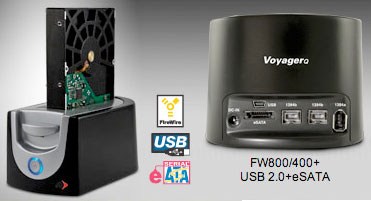
$220 SAVE $130 = 37.0% Western Digital 16.0TB Western Digital Ultrastar DC HC550 3.5-in… in Storage: Hard Drives
|

|

|

|

|

|

|

|

|

|
NewerTech Voyager Q Drive Dock
UPDATE March 2014: for modern Macs with USB3, choose the USB3 Voyager S3.
Update February 2019: for modern Macs with USB-C or Thunderbolt 3, choose the OWC Drive Dock USB-C.
On my “exceptionally handy” list is the NewerTech Voyager Q, an external drive dock for 2.5" or 3.5" SATA drives. In a second or two, you can pop in any 2.5" or 3.5" SATA drive, connecting the Voyager to your Mac via eSATA or Firewire 800 or 400 or USB. In short, it connects to just about anything out there!
Why is this handy? There are many use cases—
Backup — you can slot in a backup drive perform your backup, then remove it and store elsewhere. No hassles with drive trays, screws, etc. This is a great way to use those older slower drivers for backup that you might not otherwise use.
Cloning a system — when switching systems you can quickly slot in a spare drive, clone your system (eg with Carbon Copy Cloner), “wipe and clean” the target drive, then clone the drive in the Voyager back to your system drive. (Two backups are always advised). This makes life so much simpler when changing system configurations, since any old drive will do with no muss and no fuss with tools.
You can use the Voyager Q as a boot drive via Firewire 800, which means that any clone of your system drive can instantly have you up and running if your main system drive fails.
Connectivity — with the 4 interfaces (eSATA, Firewire 800/400, USB), you can connect to just about any system with any laptop or desktop SATA drive.
Caution
One note of caution: when removing drives, be sure to let the drive spin down first. Bad Things can happen if you grab a drive that is still spinning at several thousand rpm.
Conclusions
If you ever wanted a quick and easy solution to accessing bare hard drives, this is as easy as it gets, and the price is right. Users looking for a versatile backup system need only this unit and some bare hard drives to make rotating backups. It’s a great way to use last year’s hard drives.
Seagate 22TB IronWolf Pro 7200 rpm SATA III 3.5" Internal NAS HDD (CMR)
SAVE $60

 diglloydTools™
diglloydTools™


